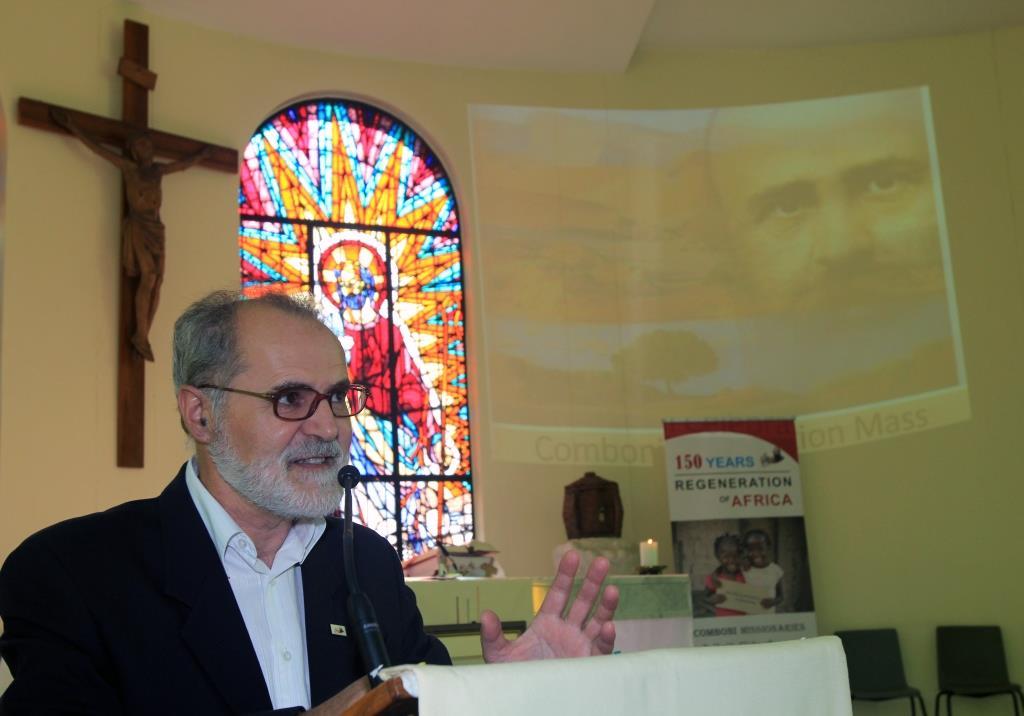Daniel Comboni
Comboni Missionaries
Institutional area
Other links
Newsletter
Monday, May 4, 2015
The Comboni Missionaries closed the celebration of the 150 years of St Daniel Comboni’s Plan for the regeneration of Africa with Africa and of the 90 years of their presence in South Africa on 25 April. The ceremony, that took place in Silverton, Pretoria, was presided by His Grace the Archbishop of Pretoria, William Slattery, and counted with the presence of the Comboni Bishop of Witbank, Joseph Sandri, the majority of the Comboni Missionaries working in the country and many friends and benefactors. In the picture: Fr. Jeremias dos Santos, Provincial Superior of the Comboni Missionaries in South Africa.
The Provincial Superior of the Comboni Missionaries, Fr. Jeremias dos Santos, in his welcome address mentioned the two events being celebrated: “The first event is that on 15 September 1864, while at prayer in Rome at St Peter’s Basilica, St Daniel Comboni had an inspiration: the only way to evangelise Africa is through Africa. We say it with these words: ‘Save Africa with Africa’, or ‘Regeneration of Africa through Africa’. We are celebrating 150 years of this event.
“The second event is that on 11 February 1924, the first Comboni Missionaries arrived in Maputo, Mozambique, by ship and travelled to Johannesburg by train, to present their credentials to Bishop Cox of Johannesburg. Then the first three missionaries reached Lydenburg on 20 March. It is now 90 years. During the whole year, since April 2014 up to date, we were celebrating these two events. We want to conclude this Comboni Year with today’s celebration and to give thanks to God for the many graces we received throughout the Year.”
In his homily, Archbishop William Slattery first highlighted how the Plan of St Daniel Comboni for the evangelisation of Africa came about: “Because of his spiritual closeness to the Heart of Jesus, Daniel Comboni was able to see further (than the anthropologists and explorers of his time). He was a visionary. He was one of those prophets who went ahead of his time, perhaps by a hundred years and saw the tremendous potential of Africa.” The Archbishop went on saying that “what Comboni envisioned 150 years ago has been realised now for more than 90 years in South Africa.”
The amount of evangelising and human promotion work done by the Comboni Brothers and priests in South Africa is remarkable. Besides establishing the Catholic Church in what is today the diocese of Witbank – a vast area that extends from just outside Bronkhorstpruit to Mozambique – where the Comboni Missionaries built more than 160 churches, they brought about great human development with the construction of hospitals, clinics, schools, pre-schools, hospices, mills, carpentries, weaving centres, the establishment of gardens and others facilities for the good of the people.
Archbishop Slattery also remembered the hardships the Comboni pioneers encountered: from a climate of suspicion (the Catholic Church was considered the “Roomse gevaar”, the “Roman threat”) to the obstacles to minister to black people (they needed a pass to enter the townships); from the need to adjust to a new reality and learn the local languages – a process that could be compared to a ‘new birth’ – to “physical strains: long journeys, small Christian communities, lack of roads and shops, lack of facilities and healthcare … which made them die before their time.”
In spite of such difficulties, there were “immense human achievements”, there was a “tremendous human advancement” said the Archbishop. It was, he added, the Founder of the Congregation, St Daniel Comboni, true aim, “to improve the lives of people". According to the Archbishop, “he wanted to uplift them out of slavery, he wanted to give them a vision, a reason for living.” He gave a concrete exemple: “Eastern Transvaal when these missionaries first came was dominated by people seeking for gold but these missionaries brought them something more marvellous than gold: they brought the very presence of Christ.”
The celebration concluded with a ‘finger lunch’ which allowed the present to move and share and come to know each other in a deeper way.








